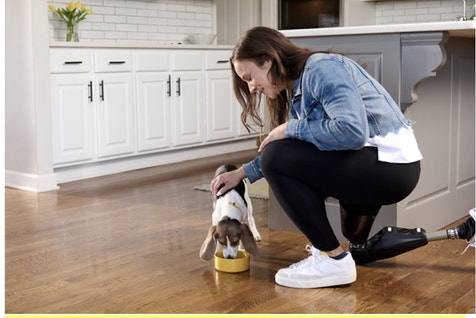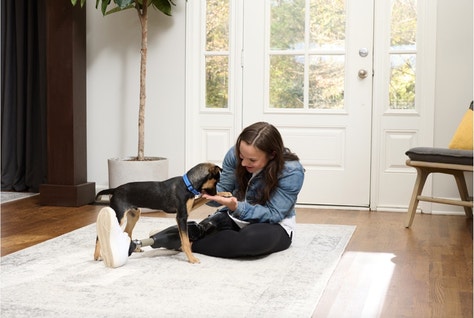
Why Adopt a Senior Dog? The Top 10 Benefits
When considering whether or not to adopt a dog, many people's minds might automatically go to the idea of adopting a puppy: cuddly, cute, and chaotic in equal measure. But not everyone is equipped (or willing) to take on a bundle of energy who can't make it through the night without a bathroom break and requires hyper-vigilance during housebreaking and teething stages, along with hours of training. Senior dogs are instant companions, ready to go on a long walk or to be the snuggle buddy or workout partner you need from the get-go.
According to the ASPCA, more than 3 million dogs enter shelters each year, and 25% of those are over the age of seven. But statistics don't count the warmth, companionship, and joy an older dog can bring into a home. Sure, puppies are cute and fun, but senior dogs come with their own benefits that often get overlooked - from already being house-trained to generally having calmer demeanours with less demand for constant attention.
In this guide, we'll discuss why you should adopt a senior dog, share some benefits of adopting a senior dog, and give you some things to think about before deciding to adopt.
Why Adopt a Senior Dog?
There's a common misconception that animals are given up for adoption because of behavioral issues, but often, a change in an owner's circumstances can result in an elderly dog being surrendered to a rehoming center. Therefore, they are left to find a new home through no fault of their own, which can prove a little more difficult for senior dogs for many reasons.
Regardless of a dog's age, adopting them from a rescue center or a dog shelter is a wonderful thing to do. But for a senior dog, this means they can live out their golden years in comfort and happiness.
Top 10 Benefits of Adopting a Senior Dog
While there are many reasons to adopt and welcome a slightly older pooch into your home, here are just 10 of them…
1. Years of fun and love are still ahead

Don’t pass up on the chance to adopt a dog just because they’re older. Different breeds of dog are considered senior at different ages. But on average, dogs live for 10-13 years and many can live even longer depending on their breed, health, and lifestyle. Talk to your vet about ways you can help keep your adopted senior dog happy and healthy. Older dogs need a new loving home too!
Just for fun: To find out your dog’s age in human years, check out our handy Dog Age Calculator.
2. They're already house-trained
Adopting an older dog means skipping the hassle of house-training a puppy. Chances are, a senior dog has already mastered this skill. They understand that going to the bathroom outside is a normal routine, so you won't have to deal with accidents in the house or the frustration of training a young pup.
Senior dogs have developed the habit and discipline to wait until they are let outside before relieving themselves. Their bladders and bowels are accustomed to a predictable schedule. As long as you maintain a regular feeding and walking pattern, bathroom breaks outside should be a seamless part of your daily routine.
3. You know their health history
Many senior dogs may have health issues, but they’ve already been addressed. Their previous owners have likely invested in essential treatments to ensure a good quality of life for years to come. This includes:
Already being spayed or neutered:
Most older dogs will be spayed or neutered before being put up for adoption, saving you the cost and stress of that procedure. It also means you'll avoid behavioral issues that can come with intact males and females and won’t have to worry about them breeding.
Up to date vaccinations:
Senior dogs are usually adopted from shelters or rescues that keep them up to date on all necessary vaccinations and preventatives. You'll have paperwork showing their shot records so you know they're protected, and you can continue a schedule as required.
Known medical conditions:
Many senior dogs may come with known medical conditions like arthritis, diabetes or heart disease that have been properly diagnosed and are being treated. The shelter or group will fully disclose any conditions, a prescribed treatment, and the associated costs so you know what you're getting into from the start. You can feel good knowing these dogs have received all necessary care and their conditions are managed, allowing them to live comfortably for years to come.
5. With older dogs, what you see is what you get
When you adopt an older dog, you know what you're getting regarding size and personality. There won't be any surprises as your new furry friend grows up. Senior dogs are set in their ways and habits, so you can expect their temperament and energy level to remain largely the same after adoption.
An older dog has an established personality, so you'll know right from the start if they prefer lounging on the couch or going on long walks. Their size is predictable too, so you can buy the right supplies (senior dogs typically prefer wet food as it’s easier for them to chew), pick out a proper collar and leash, and choose a crate size with confidence. You won't have to guess how big they might get or end up with a crate that's too small in just a few months. Their personality is developed, habits are set, and you have a good sense of the kind of companion they'll be.
6. An instant best friend
Instant companionship is one of the greatest benefits of adopting a senior dog. Unlike a puppy, an older dog typically comes to you already house-trained and past the chewing stage. They are ready to settle into your home and bond with you right away.
Senior dogs often form strong attachments to their owners because they are so grateful to find a loving home. An older dog will usually want nothing more than to be by your side, whether joining you on the couch for some cozy snuggle time, accompanying you on walks or rides in the car, or simply following you from room to room. Their loyalty and devotion can help combat loneliness and provide constant, faithful friendship.
7. They require less training and supervision
Older dogs are often house-trained and accustomed to basic cues. They don't require the constant supervision and house-training that puppies do. Most senior dogs are happy to lounge around while you're at work or running errands. They're perfectly content to sleep the day away, not needing to go outside as frequently or have as much activity and mental stimulation as younger dogs.
Older dogs make ideal companions for senior citizens or less active families. They're usually calmer and lower in energy. An older dog won't constantly bug you to play or go for long walks, although they still enjoy strolls and playtime with their owners. A senior dog can be an ideal match for people with mobility issues or health conditions. They're happy to relax at home, snuggle on the couch, and provide quiet companionship.
8. But old dogs can learn new tricks!

While a senior dog will likely already know basic cues such as 'sit' and 'stay', dogs can be trained at any age, so you can still teach your furry-friend new cues and tricks, and play games with them. Older dogs are just as smart as younger ones. In fact, they can be easier to train because they’re calmer and have a greater attention span than a puppy.
9. It can often be less expensive
Several shelters now waive or reduce adoption fees for dogs over a certain age, often around 5-7 years and up. Some shelters offer "senior for senior" programs where adopters over 65 can adopt a senior pet at little or no cost. And some shelters run periodic "senior dog adoption specials" with reduced fees for older dogs.
Private rescues that pull senior dogs from shelters will sometimes waive their normal adoption donation for senior dogs as an extra incentive. They recognize that while medical care and other costs may be higher for an older dog, the rewards of giving them a loving home for their golden years are priceless.
For budget-conscious adopters, a reduced or waived fee can make all the difference in being able to open your heart and home to an older dog in need. And, of course, for the dogs themselves, a home is the best gift of all, regardless of any adoption fee. To find out more about fido-related finances, check out our article on The Cost of Adopting a Dog.
10. You could be saving a life

By adopting a senior dog, you could be saving their life. The sad truth is that older dogs are often the last to be adopted from shelters and rescue groups. Many face euthanasia simply due to their age. Opening your home to a senior dog gives them a chance to live out their golden years surrounded by love.
The APPA reports that 34% of dogs on average are purchased from breeders, while 23% of dogs are obtained from an animal shelter or humane society. And senior dogs generally have the lowest adoption rates, as many people prefer to adopt younger dogs. By choosing to adopt an older dog, you're giving them an opportunity they may not otherwise have. Every dog deserves a loving home, no matter their age, and senior dogs can make especially devoted and grateful companions.
Old but Gold…
So there you have it: 10 reasons why you should adopt a senior dog. Though their time with you may be abbreviated, the joy and fulfillment they bring will live on forever. Visit your local shelter or rescue group today to learn more about adopting a dog in your area or visit AdoptAPet.com to start searching now. Not only will you gain a faithful companion, but you can feel good knowing you gave an older dog a loving home to call their own at last. Your new furry friend is waiting!





